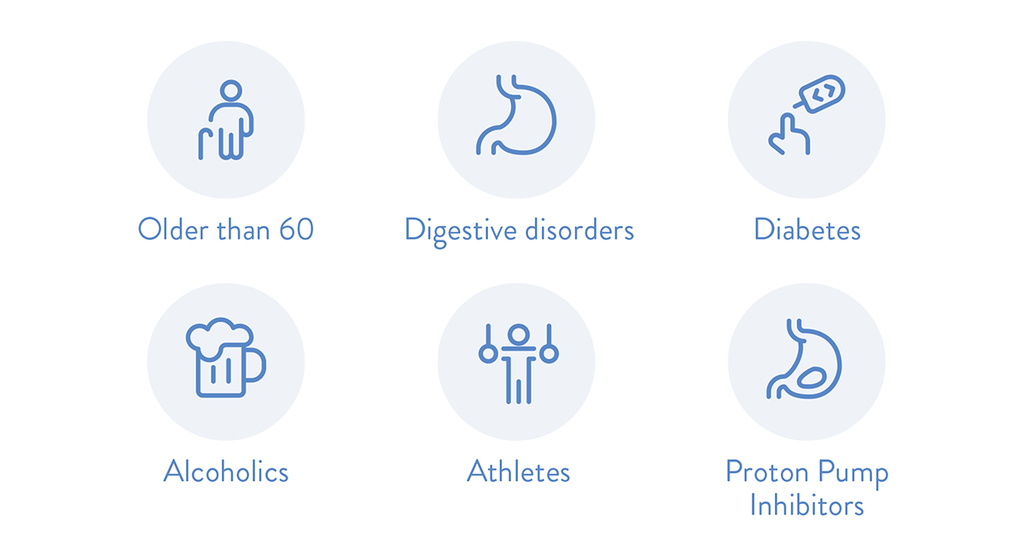Some people need a little more magnesium than others.
Are you one of those people?

Some of these groups may be at risk of magnesium deficiency because they eat fewer magnesium-rich foods (veggies) or they take meds that reduce magnesium absorption. And in other cases, they are excreting it faster than what's being provided by diet.
- Older folks. The diets of those over 70 are not great overall, and they have an added problem: as the body ages, it becomes less efficient at absorbing magnesium. Older people are also more likely to take medications that interfere with magnesium absorption.
- People with digestive disorders. Gastrointestinal disorders, like Crohn’s or Celiac diseases, hamper the body’s ability to absorb magnesium properly. People with Celiac fall into this group. So do those who've had gastric bypass surgery.
- People with type 2 diabetes. Kidneys don’t always function properly in people with type 2 diabetes, so they may be losing too much magnesium through their urine. Magnesium is especially important for people with this disease, since it’s a key facet to managing blood sugar. Pre-diabetics and people with insulin resistance fall into this category.
- People with alcohol dependence. When you think alcoholism, you usually think liver. But poor diets, gastrointestinal issues (think vomit), and increased urinary excretion of the mineral also accompany alcohol abuse.
- Athletes. Now, now now, we’re NOT giving you an excuse to skip tomorrow’s walk. But if you work out regularly you may need a magnesium boost. One study found that strenuous exercise intensifies urinary and sweat losses, which may increase the demand for magnesium by up to 20%.
- Those who use proton pump inhibitors (PPIs) like Prilosec, Zantac, Prevacid, and Nexium. Data has shown that long-term use of PPIs cuts down on the amount of acid your stomach produces. This may do a number on magnesium absorption.
- If you take these products while also on diuretic therapy, talk to your doctor about having your magnesium level tested.
- OTC versions of these drugs are intended for a 14-day course of treatment, so long-term use (a year or more) is not without risk. Continued use may result in a rare magnesium deficiency symptom that some call 'lemonade legs.'
A note of caution
If you've read all that and decide to give yourself a triple shot of magnesium pills, you might be staying close to home for a day or so. A sudden excess of magnesium can cause diarrhea along with nausea and abdominal cramping, especially if you use the oxide, carbonate, sulfate or chloride forms. If you follow label instructions on supplement bottles, you are unlikely to have any trouble. Most supplement brands do not recommend more than 400 mg of magnesium daily.
Stuff that must be said:
We sell magnesium supplements on this website. It goes without saying (but we’ll say it anyway) that we do not make any claim that taking our magnesium supplement will eliminate or reduce the risk associated with any of the conditions listed above. If you feel you belong in any of the categories above, and you grab a bottle of magnesium supplement before spinach or other magnesium-rich foods, well, tsk, tsk.
Supplements may help, but supplements alone will not restore you to complete health. We think supplements are a small piece of the health puzzle. You cannot outrun a bad diet and inactivity with pills. Most of the heavy lifting involved in restoring your health will have to come from you in the form of healthy eating and lifestyle corrections. In these articles, we are merely sharing our excitement about nutritional science and doing our best to translate dense science into easy-to-read English. We geek out on nutrition science and we think you will too. We hope it makes you a more informed consumer. Our Legal Dept says the same thing in Legalese at the bottom of this page. Enjoy.

